Come on! You can not just feed your hedgehogs anything. Like any other pet, our hedgies need a proper diet to lead healthy and thriving lives.
But what do hedgehogs eat as pets? Do they look for a wild meal even in captivity? Or can you make them eat commercial food? And most importantly, what meals are safe for them? Catch all the answers below.
Table of Contents
What Do You Feed A Hedgehog As A Pet?
Hedgehogs are tagged as omnivores (who eat both animal matter and plants) or insectivores (who live on insects and worms). If we look at the wild hedgie diet, we will see mostly proteins (worms and insects). Only a small portion includes leafy greens and fruits.

Our pocket pet quill balls follow the same food habits even when they are in captivity. However, fulfilling the nutritional demand is difficult if you blindly follow a wild diet. That is because our prickly pigs can not forage freely in the cage. Therefore, commercial pellets are often added to the diet.
So, in short, the meal chart of our hedgehogs should contain,
- Insects and worms
- Animal protein
- Leafy greens
- Fruits
- Commercial hedgehog pellets
- Water
Keep reading for more details.
Insects and Worms: Do Hedgehogs Eat Live Insects?
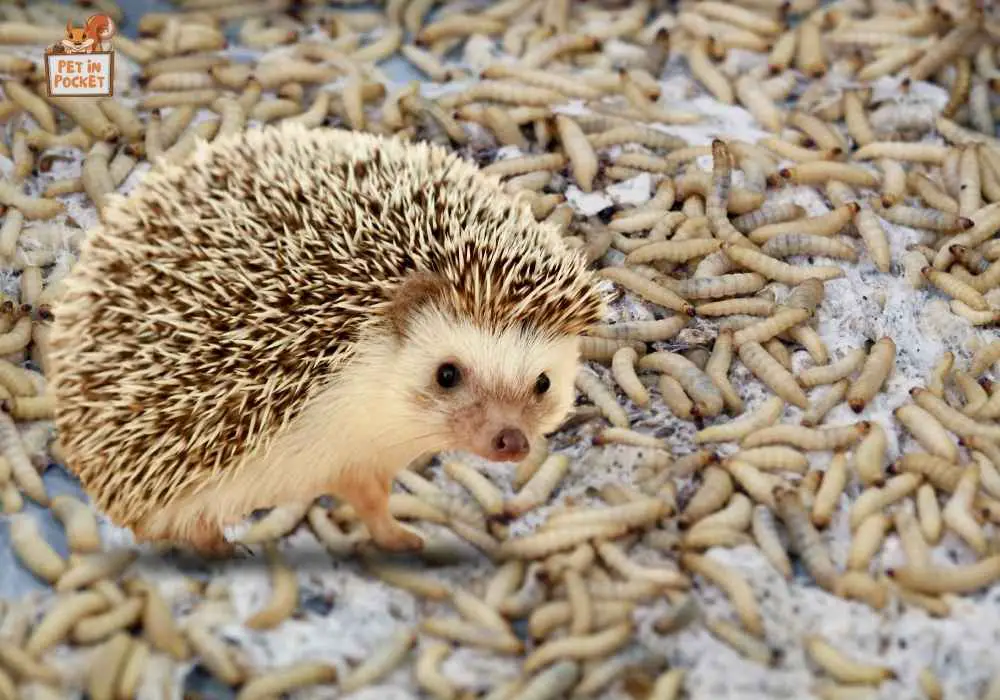
Nothing excites a hedgehog-like an insect or worm meal. In the wild, these prickly balls survive mostly on insects. The safe worms and insects for hedgies are,
- Mealworms
- Waxworms
- Earthworms
- Earwigs
- Crickets
- Fly larvae
- Beetles
- Caterpillars
- Millipedes
- Roaches, etc.
Frozen and dried worms are widely available in pet stores. Of course, your pets will enjoy those packaged insects. But we recommend feeding the hedgehogs live worms and insects.
You can buy live insects from your local pet stores. Alternatively, you can take a look at the natural ecosystem in your backyard or garden, where you will find plenty of worms.
Just scatter the live insects in the substrate and allow your hedgehogs to prey. This boosts the appetite of our little spikey friends and gives them wild stimulation.
Note: Mealworms and crickets are higher in fat content. Hence, offer these at a moderate quantity.
Animal Protein: What Is The Best Protein for Hedgehogs?
Earthworms, mealworms, crickets, and roaches are highly protein-rich. Yet, you have to add animal protein sources to provide the hedgehogs with all kinds of nutrition.
Wild quill balls hunt down lizards, small frogs, carrion, small mammals, and snakes. But we can not even imagine collecting these creepy treats for our hedgehogs.
Some owners do push the limit and feed their prickly hogs pinkie mice. But then again, we would not suggest you offer the captive hedgehogs such wild-bred prey. It can backfire on the health of our tiny quill balls.
So, we feed our hedgehogs cooked meat. Yes, you have read it right. Unseasoned (baked, boiled, browned, or roasted) meat is safe for our prickly pigs. You can use the following meat,
- Chicken
- Beef
- Lamb
- Turkey
- Duck
- Tuna
- Fish, etc.
Low-fat and cooked cat and dog meaty food is also appetizing for hedgehogs. These packet items must have at least 30% protein and less than 20% fat. We occasionally offer our pet hedgehogs boiled eggs as protein shots.
Warning:
Never force the hedgehogs to eat raw or seasoned cooked meat. This will make the pets severely ill. Also, cut the meat into small pieces and remove any bones. Otherwise, the hedgehogs might choke to death.
Leafy Greens & Vegetables: What Greens Do Hedgehogs Eat?
Veggies and leafy greens are not a staple for hedgehogs. Instead, consider these as treats for our little prickly pigs. Munching on the leafy greens or vegetables will bring variety to their taste bud and make meals interesting. Safe greens and veggies for hedgies are,
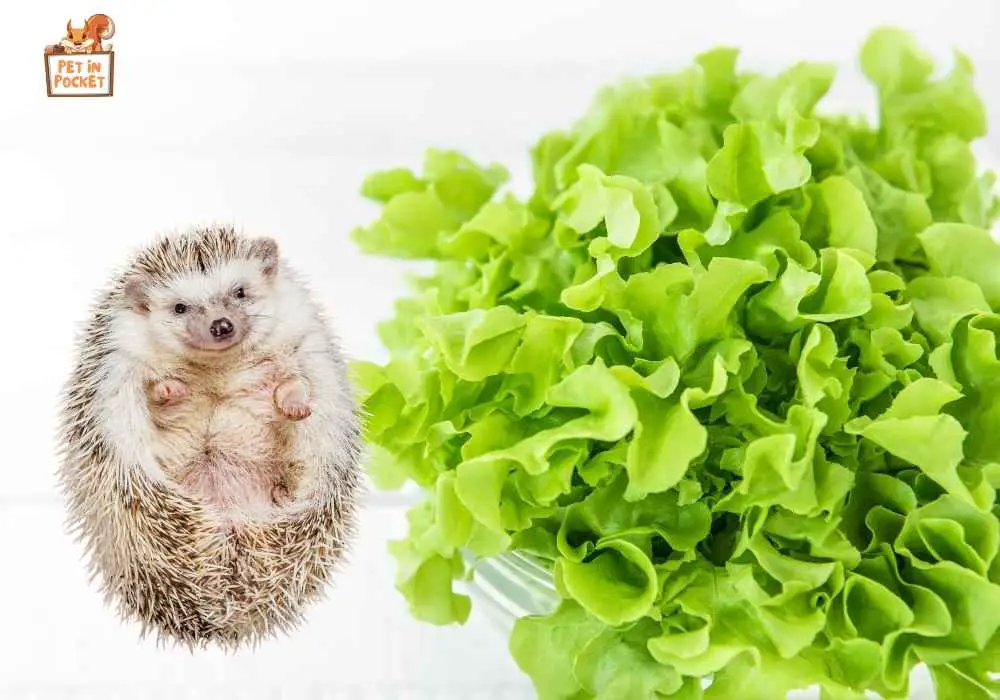
- Arugula
- Kale
- Courgette
- Romaine lettuce
- Leaf lettuce
- Collard greens
- Mustard greens
- Turnip greens
- Dandelion greens
- Collard greens
- Asparagus
- Green pepper
- Swiss chard
- Sweet potato
- Broccoli
- Cucumber
- Corn
- Peas
- Carrots
- Escarole
- Pumpkin
- Watercress
- Radish
Warning:
Hedgehogs can not process vegetables and leafy greens very well. So, do not make them full on these items. Instead, offering a small portion of veggies and greens is just fine. Besides, chop the harder veggies into small cubes so that hedgies can chew them easily.
Fruits: Do Hedgehogs Eat Fruits?
Our tiny quill balls can not absorb high sugar. So, the fruity punch might not sit right with their digestion system. We suggest small fruit treats once in a while to reward the pets and boost their appetite. Here is what our hedgehogs can eat,
- Banana
- Apple
- Pears
- Cherry
- Watermelon
- Honeydew
- Cantaloupe
- Mango
- Papaya
- Peach
- Plum
- Kiwi
- Berries without skin
Commercial Pellets: Is Hedgehog Food Good for Hedgehogs?
Only high-quality and low-fat commercial foods that are specifically designed for hedgehogs are safe. Usually, fresh organic food is not always enough for the pet hedgehogs. In the wild, they forage and fulfill their nutritional requirements. However, in captivity, an organic diet might lead to mineral deficiency.
That is why commercial all-formula pellets are always on our hedgehog diet chart. However, overfeeding these protein-rich pellets can be dangerous. Ideally, 1 to 3 tablespoons of pellets every day is considered healthy. We suggest consulting a vet before switching to a new commercial food.
Water: Should You Give A Hedgehog Water?
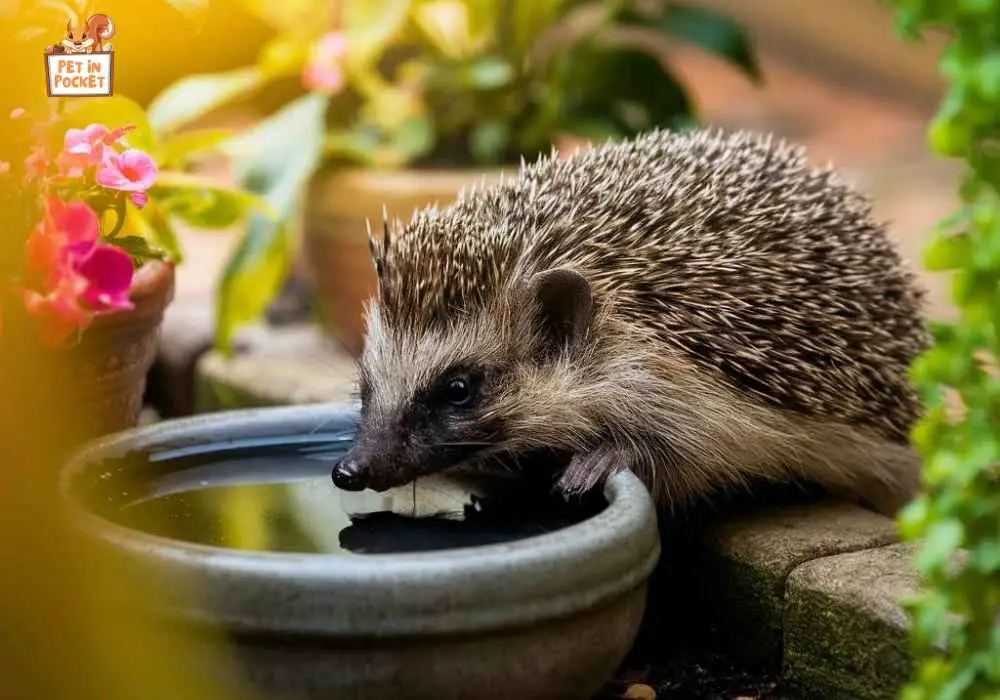
Hedgehogs are surprisingly thirsty. Hence, an accessible water source is mandatory for them. We have hung multiple bottles with clean tips inside the cage. Our prickly balls take great interest in drinking water from the bottles.
However, you can offer them water in shallow bowls, too. In this case, make sure the water source is heavy so that the hedgehogs can not trip the bowl.
What Do African Hedgehogs Eat?
African pygmy hedgehogs depend on the same protein-rich diet. In the wild, these creatures live on creepy crawls, lizards, bird eggs, snails, mealworms, crickets, roaches, etc. The domestic pygmy hedgies will enjoy the same meals. Here is what you can feed the pets,
- Dubia Roaches
- Crickets
- Hornworms
- Snails
- Calci-Worms or Phoenix Worms
- Superworms
- Mealworms
- Earthworms
- Waxworms
- Silkworms
These African hedgehogs will also occasionally appreciate mashed potato, corn, peas, broccoli, cauliflower, carrot, etc. In short, pygmy hedgehogs have the same food habits like other quill balls.
How Much and How Often Should You Feed Your Hedgehog?
Hedgehogs need 1 to 2 tablespoons of dry food, insects, or worms every day. You can also add 1 tablespoon of veggies, fruits, or whatever treat you have in stock. The food quantity might increase or decrease depending on the size of the hedgehog. Ideally, hedgehogs eat approximately 8% to 10% of their body weight.
You can feed your quill balls once every night. Some owners settle for two meals, one in the early morning and one in the early evening.
The feeding routine is crucial for hedgehogs. Overeating leads to obesity and fat accumulation under their armpits and necks. This can hinder their movements and cause physical complexities. Hence, install a wheel in the cage so that the pets can burn excess fat through exercise.
Special Note:
Hedgies require calcium or multivitamin supplements twice or thrice a week when you follow a pellet and organic mixed meal. On the other hand, if your hedgehog is on a dry pellet diet, feed them gut-load live worms and insects every other day.
Toxic Food: What Can Hedgehogs Not Eat?
Our spikey little friends thoroughly enjoy new treats. They will barely refuse any item you offer them. But remember, some meals do not suit the hedgehog’s digestion process, and the pet might fall sick.
We have listed the items you must leave out from your hedgehog’s diet,
- Avocado
- Celery
- Milk
- Dairy products
- Raw eggs
- Raw meat
- Processed meat
- Bread
- Iceberg lettuce
- Dried fruits
- Raisins
- Sultanas
- Currants berries
- Seeds
- Sunflower hearts
- Nuts
- Peanuts
- Starchy vegetables
- Dried vegetables
- Hard, raw, uncut vegetables
- Salty and sugary human treats
Conclusion
An insect-based meal is perfect for hedgehogs. Add small portions of greens and fruits to the diet to boost their appetite. In captivity, owners are mostly dependent on safe pellets to raise their hedgies.
FAQ
What is a Hedgehog’s Favorite food?
Hedgies prefer an insect-based diet over anything. Their favorite items are mealworm, waxworm, earthworm, cricket, snail, etc. Occasionally, you can offer them unseasoned cooked meat cut in small pieces.
Can Hedgehogs eat rice?
Owners occasionally offer their hedgehogs boiled rice with boiled eggs and tofu. The meal will not hurt the hedgies, and they might even enjoy it. However, rice has little nutritional value for our hedgehogs.
Does a Hedgehog eat meat?
Meat can be a rich protein source for hedgehogs. They will eat beef, lamb, turkey, chicken, tuna, etc. But raw meat is hazardous to their health. Always feed the pets unseasoned and cooked meat.
Can you give Hedgehogs milk?
Hedgehogs are lactose intolerant. They can not process milk even if they chug the entire bottle. So, offer them only water to quench their thirst.
Can Hedgehogs eat any human food?
Cooked meat, sliced veggies, and diced fruits are the only human foods hedgehogs can safely consume. Fast food and bakery items are not good for them. Feeding them sugary and salty content will cause an upset stomach and vomiting.
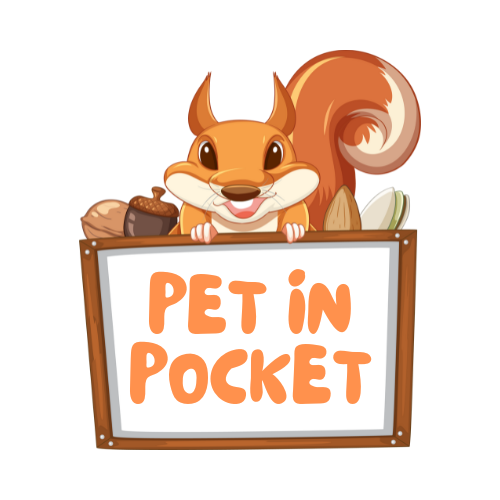
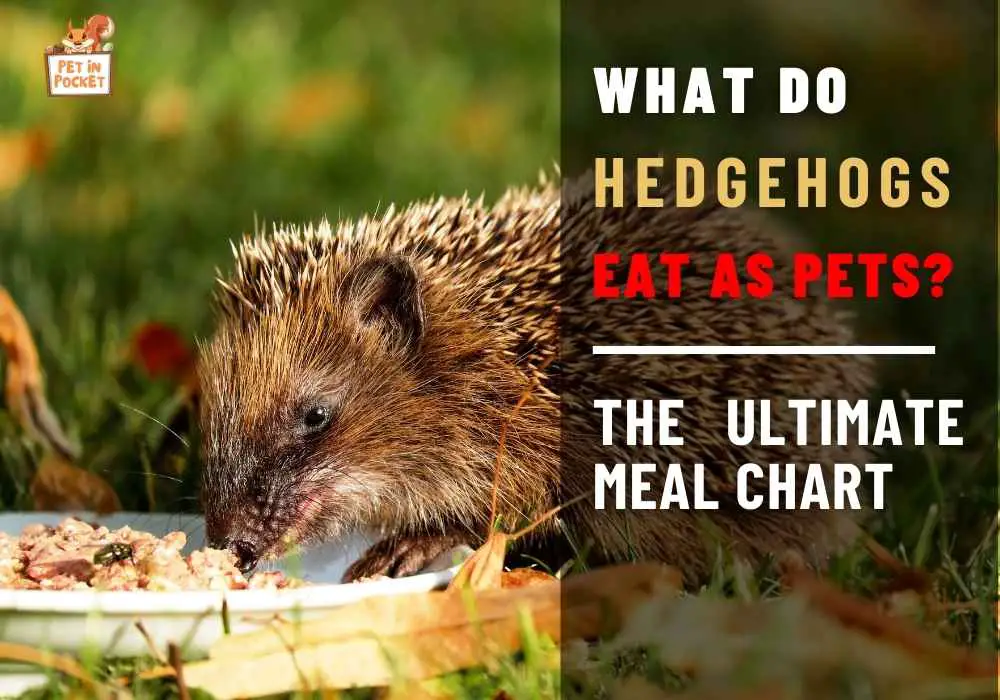



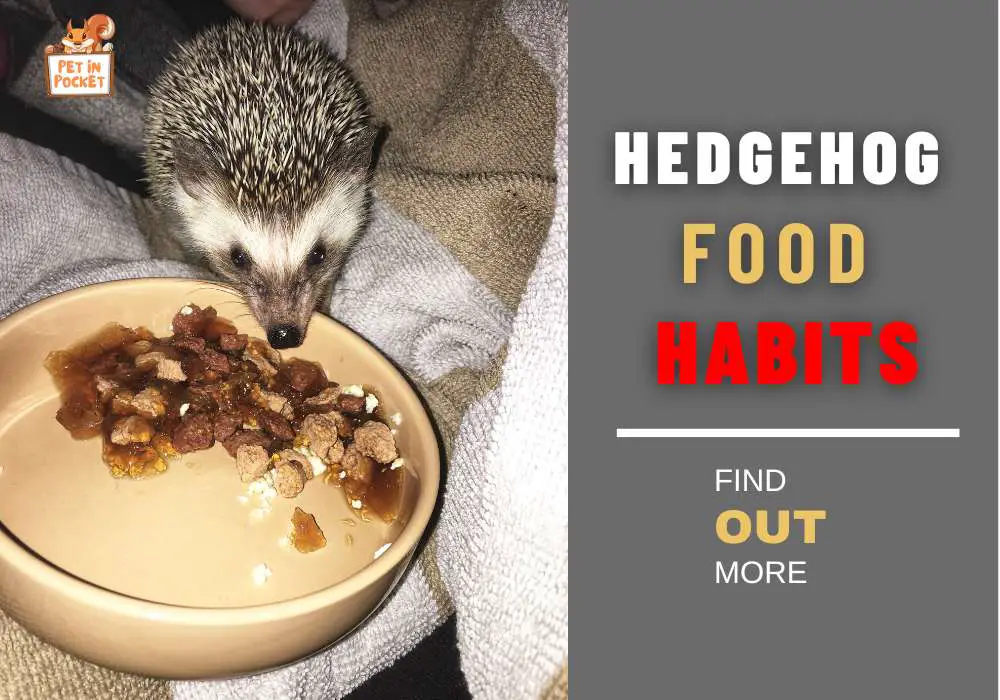
Leave a Reply